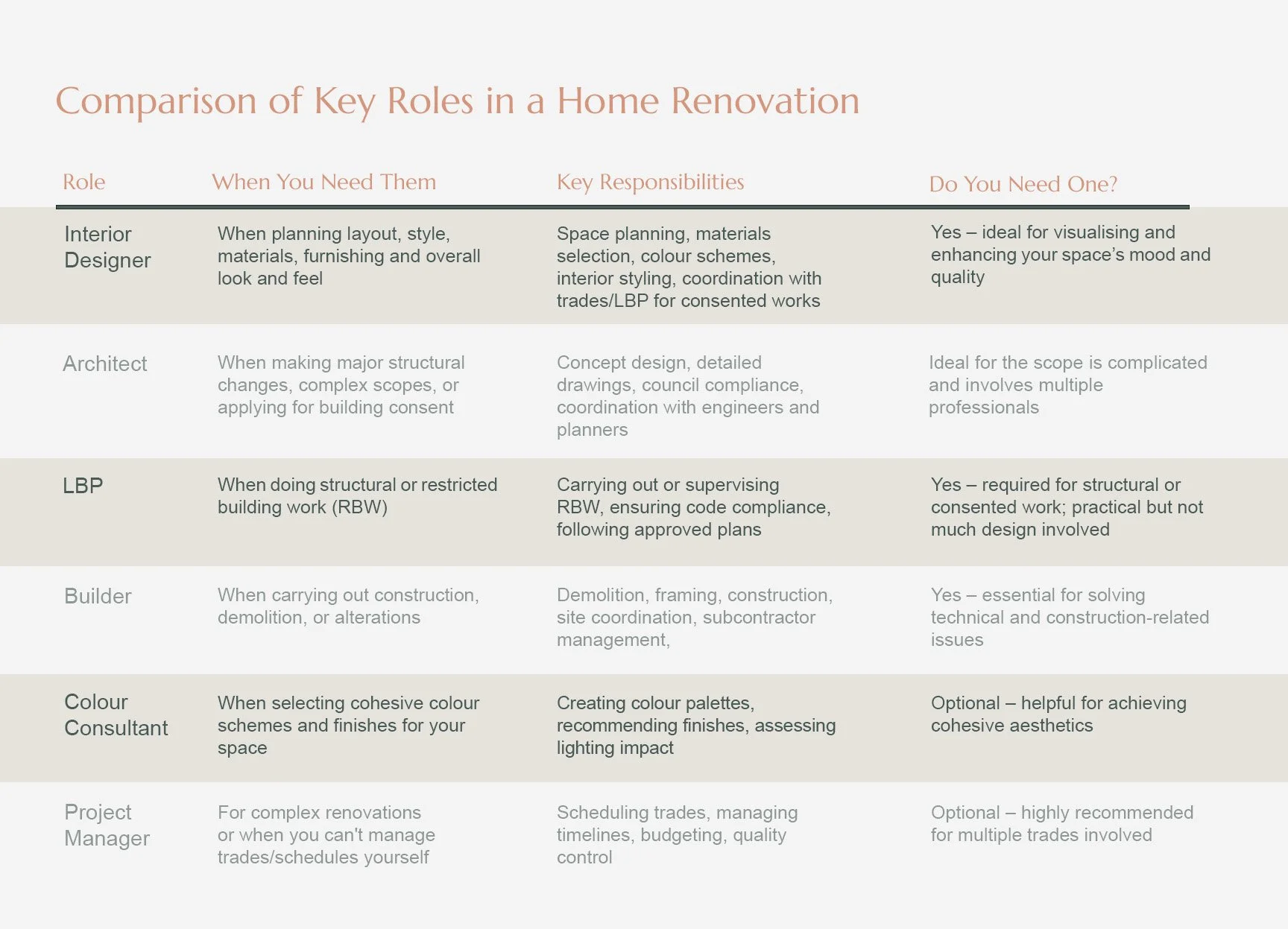First Home Renovation in Auckland? Practical Tips on the Roles of Key Trades
Who Does What in a Home Renovation?
Renovating your first home is exciting—but it can quickly feel overwhelming if you’re not sure which professional to call or when. From interior designers to builders and architects, understanding who does what will help you plan smarter, stay on budget, and avoid common renovation pitfalls.
Here’s a breakdown of the key trades involved in a typical Auckland renovation and how they contribute to your project:
1. Interior Designer – Your Space Stylist and Functionality Expert
An interior designer helps you make the most of your home's layout, style, and functionality. They consider how you live, how each space flows, and how to reflect your personal taste within your budget.
Designers often provide tailored guidance, including furniture layouts, finishes, and paint suggestions—helping you visualise and confidently execute your dream space.
Key Contributions:
Space planning and layout optimisation
Materials and finishes selection
Interior styling and furnishing recommendations
Coordination with other trades during renovation
2. Architect – The Big Picture Thinker
If your renovation involves structural changes—such as removing walls, adding an extension, or modifying the roofline—an architect is essential. They create design concepts that balance form, function, and compliance with local council regulations.
For projects that require building consent, an architect can prepare and submit the necessary documentation.
Key Contributions:
Concept design and detailed drawings
Advice on building consent and compliance
Coordination with structural engineers and planners
Note: Smaller interior-only renovations might not require an architect, especially if no building consent is needed.
3. Licensed Building Practitioner (LBP) – The Qualified Builder You Can Trust
In New Zealand, certain types of building work—especially structural and weatherproofing elements—must be carried out or supervised by an LBP. Their role ensures that work meets the Building Code and is legally compliant.
Key Contributions:
Carrying out structural and consented building work
Following approved plans and specifications
Ensuring code compliance during construction
Tip: Always check if your builder is an LBP if you’re doing more than cosmetic renovations.
4. Builder – The On-Site Executor
The builder brings the plans to life. Whether or not they’re LBP-licensed depends on the scope of work. Builders handle the physical work and coordinate trades like plumbers, electricians, and tilers.
While some builders can manage consents and construction logistics, they may not always offer the same spatial insight or design finesse as an interior designer when it comes to layout, material selection, and colour harmony.
Key Contributions:
Demolition, framing, and construction work
Site coordination and subcontractor management
Liaison with the client and designer
5. Colour Consultant – Your Palette Pro
Choosing the right colours can be more complex than expected. A colour consultant helps you develop a cohesive colour scheme for your interiors and exteriors, ensuring it suits your space, light conditions, and personal preferences.
Key Contributions:
Creating harmonised colour palettes (paint, tile, flooring)
Advising on finishes and lighting impact
Helping avoid costly colour mistakes
Local Tip: Some paint suppliers like Dulux offer colour consultation services—often free or discounted when you purchase paint through them.
6. Project Manager – The Coordinator and Timekeeper
If your renovation is complex or you’re short on time, a project manager can keep things running smoothly. They handle day-to-day communication, scheduling, budget tracking, and ensure work is completed to standard.
Key Contributions:
Managing timelines and trade schedules
Coordinating deliveries and inspections
Acting as your single point of contact for updates
Bonus Tip: Start With a Design Plan
Before engaging builders or consultants, begin with a clear design direction. A well-thought-out plan helps define your goals, guide your budget, and keep communication smooth throughout the project.
While we don’t provide structural advice, Bean Interiors brings a solid architectural background to every project. This means we can suggest practical, design-focused changes that improve how your space functions and feels. We also work closely with trusted Licensed Building Practitioners (LBPs), collaborating to turn ideas into well-executed, realistic outcomes.
At Bean Interiors, we help first-time renovators in Auckland feel confident and inspired, offering tailored design guidance and working closely with trusted trades to bring your vision to life. Talk to us your first project!


